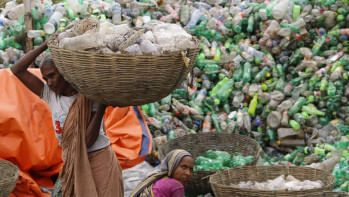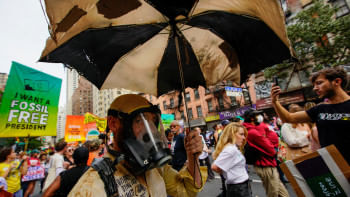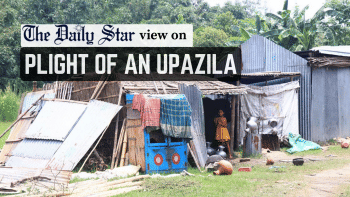From apathy to activism: Who’s gonna clean my lake?

Ah, Saturday again! It's time to act like a modern-day Good Samaritan. Time to point out social woes with the swipe on my computer keyboard to contribute to the ongoing issues and nudge the gears for a positive change. I stare at the words on my computer screen to realise their inefficacy. The story of a group of young activists led by a cartoonist who just cleaned up a canal running through the Mohammadpur Society Limited area reveals the inherent irony of my position.
While travelling down one of those roads, I was amazed by the dash of colour that had brightened the culvert bridges. And I could actually see raindrops splashing and making ripples in the canal. I read about the online call made by cartoonist Morshed Mishu to gather over 200 volunteers who participated in an impressive clean-up drive. On September 21, when Dhaka was completely submerged by nonstop rain, Mishu watched a video of the flood in the Mohammadpur neighbourhood and thought of cleaning the canal. He contacted the local ward councillor, Asif Ahmed Sarkar, for help. The volunteers and the city corporation crew worked tirelessly for two days to finally make the water flow. Sitting in my car, I imagined the enthusiastic crew out there, knee-deep in mud and muck, assiduously hauling debris and trash from the water's depths. They don't stop at talking; they take action, making me vividly aware of the difference between armchair social criticism or political rhetoric and real-world activism.
I remember about a year ago, one of the city mayors (north) accomplished one of his vaulted missions by riding a boat up the Ramchandra Canal to the Buriganga River. We saw army personnel removing unauthorised construction, gigantic cranes picking up rubbish, and tonnes of filth being removed. After the photo opportunity, it was back to business as usual. I grumbled to myself about the return of the rubbish that had to be cleaned by Mishu and Co. Then again, wasn't maintaining the canal the responsibility of the local residents?
I drove away. The speed at which you may drive in Dhaka gives you plenty of time to think about many idle matters. I look at the lake that runs into Gono Bhaban next to the Agargaon trade fair ground, and wonder how you can have the largest mosquito breeding ground in an area frequented by flag-waving, hooter-screeching bosses. I watch children playing in bushy patches and wonder why the area cannot be turned into a multi-use space with park options. Every time there is a fair, they spend millions on makeshift structures that they demolish after a month. There must be more effective ways to keep the location for seasonal fairs while allowing for morning walks, child sports and other neighbourhood activities.
I take the link road parallel to Bijoy Sarani and the Prime Minister's Office. Under the lamp, it does get quite black. While the VIP road is kept in a good condition, the side road is marked by potholes, poor management, and little to no landscaping. What does it say about our culture? We are occupied with cosmetic changes rather than dealing with the root problems.
Unless the canals through which the waste waters are released to larger sources in Mohammadpur are maintained on a regular basis, the much-hyped road islands and the ornamental plants in the Dhanmondi area are of no use. If the kidneys (i.e. filters) are not cleared regularly, the water will backflow, making the entire body toxic.
After the waterlogging on September 21, the entire city of Dhaka came to a halt. City corporation officials posted photos of tonnes of plastic bottles and ceramic items that were pulled from the sewage system. The image was meant to degrade the citizens who lack conscience and responsibility. Let me return the favour to our city fathers, who are so adept at the blame game.

Dhaka is a destination for many people, including those who come from rural and small-town backgrounds. It could take some time for these people to get used to the diversity and complexity of city life. Not everyone is as willing, open or adaptable to city life as others. Higher-socioeconomic-class people may have easier access to the city's services and resources, which might make adjusting simpler. For those residing in slum regions, however, this may not always be the case. However, both groups share the same resources. Those who reside in privileged areas of Gulshan, Banani, Baridhara share the Gulshan-Hatirjheel lake with the residents from Badda, Korail and Rampura, among others. The city will never be functional if we maintain a two-tier support system.
The waterlogging was a great leveller as it proved that our plights as city-dwellers are interdependent and that we are all on the same boat. We need to come under the same strategy and scrutiny for making the city liveable. All residents must follow the same rules. For that, we must inform the locals about the negative effects that littering, pollution and neglect have on the environment and society. There should be punishment for defaulters and a reward system for ideal citizens.
Civic engagement like the community clean-up initiatives undertaken by Morshed Mishu needs to become a regular feature so that there is a sense of ownership and responsibility. An informed citizenry will ensure that their public officials are doing their part to improve and expand public infrastructure, including the waste management systems, public transportation and green spaces. They will make sure that city officials remain transparent and accountable.
The challenge is to make each city resident an informed and responsible stakeholder. Our schools, where environmental stewardship and civic responsibility may be taught from an early age, can be a good place to start. City-dwellers are more likely to create a sense of community and connectedness to their environment once they have a role in civic decisions. We have already seen how some of the gated communities in Niketan, Nikunja, and the DOHS areas have taken greater responsibility for protecting and improving their environment. These curated places have added to a feeling of "neighbourhood pride," which is missing in other places.
I look at my typed words and realise that they are attainable. To lead us in the correct direction, we require more doers like Mishu who cleverly rewords the motto "Khela Hobe" to "Khale Hobe."
Dr Shamsad Mortuza is professor of English at Dhaka University.
Views expressed in this article are the author's own.
Follow The Daily Star Opinion on Facebook for the latest opinions, commentaries and analyses by experts and professionals. To contribute your article or letter to The Daily Star Opinion, see our guidelines for submission.

 For all latest news, follow The Daily Star's Google News channel.
For all latest news, follow The Daily Star's Google News channel. 








Comments